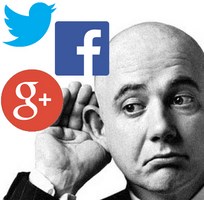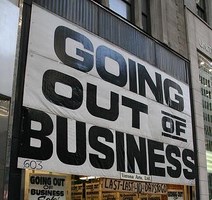Part 3 of a multipart series (part 2 here, part 1 here)
 It has been awhile since I have added to this fascinating subject, but today I feel inspired so here goes: We have been discussing going with the flow, and what happens when “the flow stops flowing”? In part one, I discussed the foremost question one must ask, and that is how one is to define flow—is it money, is it being purpose driven, or is it something else? I think that needs to be known upfront before we can determine if and where the flow has actually stopped flowing.
It has been awhile since I have added to this fascinating subject, but today I feel inspired so here goes: We have been discussing going with the flow, and what happens when “the flow stops flowing”? In part one, I discussed the foremost question one must ask, and that is how one is to define flow—is it money, is it being purpose driven, or is it something else? I think that needs to be known upfront before we can determine if and where the flow has actually stopped flowing.
In part two I discussed the possibility that what we are using to measure flow might be something not really that high on our values. I use money as the example, but it really could be anything—success (whatever that is; another term we would need to define), contact list, people reached, or whatever. People often believe they should value something valued by others, an authority or society as a whole, but we value what we value—trying to make it something else will only lead to frustration and possibly depression. A much better strategy would be to honor, appreciate and submerge yourself in what you truly value.
 But now the question arises: What if we do, in fact, value money? And let’s say it has been our measure of flow, and perhaps that flow has stopped flowing. What might be some reasons for the drying up? Ahh…now this is an excellent question. When a scenario of this kind does occur I find it enormously revealing, and while I suspect it can be difficult for the one immersed to see the big picture, I do believe this type of thing is a completely ordered event, one meant to shape our growth and development.
But now the question arises: What if we do, in fact, value money? And let’s say it has been our measure of flow, and perhaps that flow has stopped flowing. What might be some reasons for the drying up? Ahh…now this is an excellent question. When a scenario of this kind does occur I find it enormously revealing, and while I suspect it can be difficult for the one immersed to see the big picture, I do believe this type of thing is a completely ordered event, one meant to shape our growth and development.
The universe is an ordered entity. There are subtle energies at play at all times; these energies have effects on sentient beings such that they push and prod us to move in the direction of our dharma. Remember that? Dharma is our life’s purpose, and we all have one. Better to tune-into yours than to blow off the notion as mumbo-jumbo, and allow life to unfold randomly. These subtle universal forces act on individuals all the time—physically, mentally, socially, through personal relationships, economically, and through acts of nature. These forces are nature moving you in the direction of dharma fulfillment.
So here is a short-list of reasons why a formerly abundant flow might have dried up:
 It might be time for new products, services or information. A lack of flow may signify a lack of interest in your current product, service or program. Not a biggie—just time to evolve. Listen to your clients and customers—ask them what they want. That is the great thing about social media: you can see what people are into—what they are posting about, their conversations, their questions to you—all these give information as to how you can improve what you provide. Everything changes, including what people are looking for. Thus it may be the product, service or information that’s stagnant reflecting itself in flow.
It might be time for new products, services or information. A lack of flow may signify a lack of interest in your current product, service or program. Not a biggie—just time to evolve. Listen to your clients and customers—ask them what they want. That is the great thing about social media: you can see what people are into—what they are posting about, their conversations, their questions to you—all these give information as to how you can improve what you provide. Everything changes, including what people are looking for. Thus it may be the product, service or information that’s stagnant reflecting itself in flow.- It may be time to change your avenues of dissemination. In other words, you might need to bring yourself up to speed with what’s resonating with people today. Some people, companies and industries are slow to catch onto current lifestyle trends. At the rate at which things change today, that’s professional and business suicide. And those most susceptible are, without a doubt, entities that have enjoyed previous success. It is very hard to not leave well enough alone, but fail to change with the times and watch the flow stop flowing suddenly and dramatically. I am amazed at how many in my profession of chiropractic are still clueless about having and maintaining something as basic as a website (Stone Agers)! Then there are those who say they don’t do social media. Uhh…well then you are killing yourself (Bronze Agers). What about review sites, videos, blogging, Yelp, mobile apps, and the list goes on and on. Have you failed to take your business to the next level (Iron Agers)? Well duuuuuuhhhhh….!

- It might be time to reevaluate your product, service or information’s value to people. Yes, maybe you think your business is more valuable than it really is. You might be right on the money with your self-assessment, but it never hurts to reexamine. Listen, I have described here how business is a monetary exchange of perceived value. If the flow has stopped flowing, and that flow is money, then to me THAT speaks volumes! It doesn’t mean you suck—it simply means that, without question, it’s time to grow. Face it, people just aren’t that into some things anymore. People’s needs and interests evolve. Film developing, CDs and DVDs, the Yellow Pages—these are just a few examples of things that are dead or dying fast. C’mon! I am sure you can think of a few relics in your industry…heck you might even be attached to one or more. It sure wouldn’t be so hard for me to see why your flow has stopped flowing if you are selling the obsolete.
 It might just be that your current product, service, or information is no longer one of your highest values. Hey people change! Our interests grow, we evolve, we desire to touch more people—this is a natural process in life. And while you may still have love for what you do, it may be time to see how you can expand yourself. Maybe it is time to teach, or to write books, or to speak to corporations—all of these would be growth for somebody who is working one-on-one with clients. Remember subtle energies are at play within the universe, and that energy flows between and among people. If you are no longer truly inspired by what you do, but are doing it because, “it pays the bills,” well then guess what? Your clients will feel it too; and they will stop coming—believe me, I’ve seen it more times than I can count. It’s all energy, and you can’t hide your underlying feelings (except from yourself). Consider it a wake-up call, for you to expand into the next leg of your dharmic path. I’ve met attorneys on their way to medical school, corporate paper-pushers moving on to give guided adventure tours, you name it. This life is meant to be lived NOW, today! Listen to what your heart is really telling you and go after what you love. If you don’t know how to do it, then contact me: I help people every day with this exact dilemma (drnick@drnickcampos.com)
It might just be that your current product, service, or information is no longer one of your highest values. Hey people change! Our interests grow, we evolve, we desire to touch more people—this is a natural process in life. And while you may still have love for what you do, it may be time to see how you can expand yourself. Maybe it is time to teach, or to write books, or to speak to corporations—all of these would be growth for somebody who is working one-on-one with clients. Remember subtle energies are at play within the universe, and that energy flows between and among people. If you are no longer truly inspired by what you do, but are doing it because, “it pays the bills,” well then guess what? Your clients will feel it too; and they will stop coming—believe me, I’ve seen it more times than I can count. It’s all energy, and you can’t hide your underlying feelings (except from yourself). Consider it a wake-up call, for you to expand into the next leg of your dharmic path. I’ve met attorneys on their way to medical school, corporate paper-pushers moving on to give guided adventure tours, you name it. This life is meant to be lived NOW, today! Listen to what your heart is really telling you and go after what you love. If you don’t know how to do it, then contact me: I help people every day with this exact dilemma (drnick@drnickcampos.com)
The universe is a perfectly ordered entity, even if it does not seem that way on the surface. Even when it looks like life is reigning in chaos, forces are pushing you toward fulfilling your dharma. Where would the world be had Walt Disney, J.K. Rowling or Thomas Edison not followed their universal push?
 A true flow never stops flowing, not without another channel opening in its place. We exist in an energetic universe, where transformation is the key. You have to ask the right questions, do the right evaluations, and then listen to the messages the universe provides through its subtle energies. It helps to be in-tune with those energetic fluctuations, and there are methods for becoming more proficient at doing so (contact me for available courses or consultations). But the most important thing is to understand this aspect of the universe, and how its energies are at play constantly to push you toward fulfilling your life’s mission. Without this knowledge and understanding, it IS a universe of chaos, and it would not surprise me to see someone completely baffled by an apparent “flow that has stopped flowing”. But wake up to the magnificence of the universe, and follow its natural flow. If you open yourself to this possibility, I promise you will be amazed at what unfolds.
A true flow never stops flowing, not without another channel opening in its place. We exist in an energetic universe, where transformation is the key. You have to ask the right questions, do the right evaluations, and then listen to the messages the universe provides through its subtle energies. It helps to be in-tune with those energetic fluctuations, and there are methods for becoming more proficient at doing so (contact me for available courses or consultations). But the most important thing is to understand this aspect of the universe, and how its energies are at play constantly to push you toward fulfilling your life’s mission. Without this knowledge and understanding, it IS a universe of chaos, and it would not surprise me to see someone completely baffled by an apparent “flow that has stopped flowing”. But wake up to the magnificence of the universe, and follow its natural flow. If you open yourself to this possibility, I promise you will be amazed at what unfolds.








 But not just money that people mistakenly think they value: also success, relationships, children, a particular career can all be false drives when a person thinks those things are virtuous and should be valued. However, if I have said it once, I have said it a thousand times: No values are more virtuous than any others! You love art, fashion, music, sports, physical intimacy, animals, math, scuba diving—then indulge in them. You are not required to value money, a particular profession, children, or anything else. In fact trying to do so, outside of your true values, is the quickest way to frustration, and ultimately to depression.
But not just money that people mistakenly think they value: also success, relationships, children, a particular career can all be false drives when a person thinks those things are virtuous and should be valued. However, if I have said it once, I have said it a thousand times: No values are more virtuous than any others! You love art, fashion, music, sports, physical intimacy, animals, math, scuba diving—then indulge in them. You are not required to value money, a particular profession, children, or anything else. In fact trying to do so, outside of your true values, is the quickest way to frustration, and ultimately to depression.



















